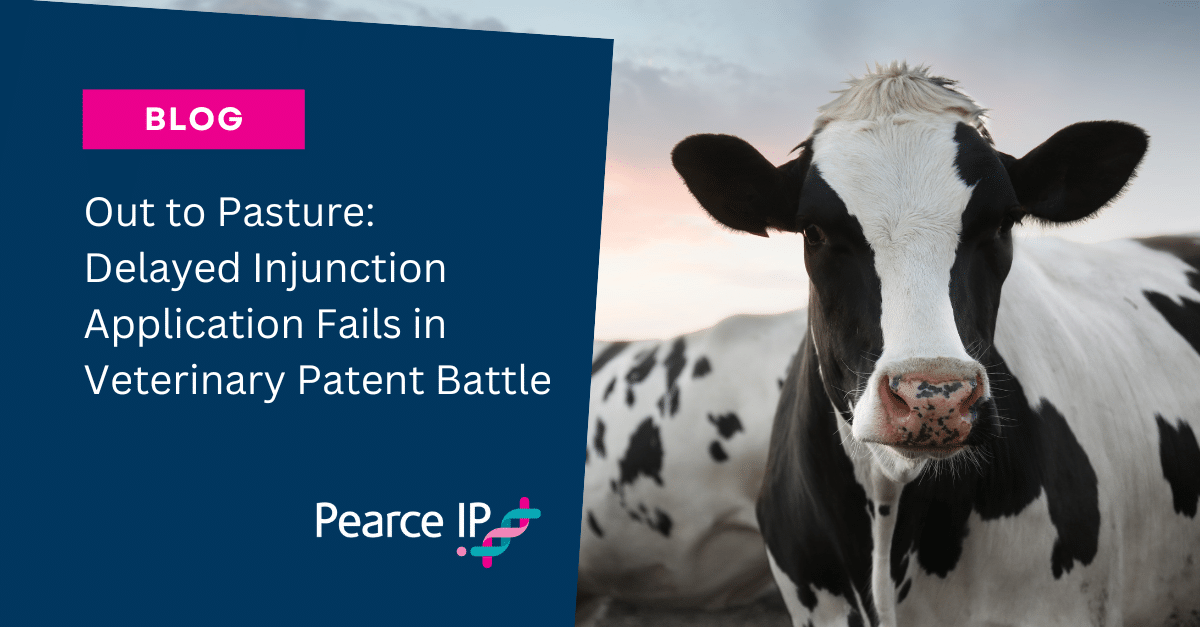| Date of decision: | 17 December 2024 |
| Body: | Federal Court of Australia |
| Adjudicator: | Justice Jackman |
Highlight
Justice Jackman of the Federal Court has refused to grant Virbac (Australia) Pty Ltd (Virbac) an interlocutory injunction to restrain Abbey Laboratories Pty Ltd (Abbey) from launching a generic version of Virbac’s Cydectic Platinum, used to treat and control parasites in beef and dairy cattle. Justice Jackman’s decision confirms the importance of not delaying when seeking injunctive relief, while also highlighting the relative difficulties faced by each party to quantify its potential losses.
Background
The dispute concerns AU2012227241 (the Virbac Patent) regarding a veterinary topical formulation marketed by Virbac under the name Cydectic Platinum.
In July 2023, Abbey applied to register its generic version of Virbac’s product, Levamox Duo. In September 2023, Virbac wrote to Abbey informing Abbey that it was aware of the application. Despite multiple exchanges between the parties in early 2024 which made it clear that the launch of the generic animal health product was imminent, it was not until December 2024 that Virbac sought an interlocutory injunction. This delay of 10 months between being made aware of Abbey’s application and seeking an interlocutory injunction was terminal to Virbac’s application.
- In July 2023, Abbey applied to register its generic version of Virbac’s product, Levamox Duo. In September 2023, Virbac wrote to Abbey informing Abbey that it was aware of the application.
- Further exchanges followed in February 2024. Abbey confirmed to Virbac that its application would soon proceed to registration (it in fact achieved registration the following day) and that Abbey was “in the process of getting ready to launch Levamox Duo onto the Australian market”.
- Virbac responded later that month reserving its rights to prevent Abbey’s proposed launch, but did not seek any undertakings to refrain from launching nor threaten an interlocutory injunction.
- In late February 2024, Abbey’s solicitors wrote to Virbac stating that the launch of Levamox Duo would not infringe any valid patent rights and flagged Abbey’s intention to seek revocation of the Virbac Patent if Virbac sought to enforce it against Abbey.
- Virbac responded in April 2024 reserving its right to issue infringement proceedings without further notice if Abbey proceeded with its planned launch.
- In May 2024, Abbey commenced revocation proceedings.
- Virbac’s June 2024 correspondence only indicated an intention to cross-claim for infringement and seek expedition should Abbey launch prior to a final hearing – making no demand for any undertaking nor threatening an application for injunctive relief.
- Throughout 2024, Abbey continued its launch preparations, facing some delays due to regulatory and manufacturing issues.
- By November 2024, Abbey had begun marketing Levamox Duo at industry conferences, considering the December conference season critical for securing orders for 2025.
In December 2024, Virbac sought an interlocutory injunction to prevent the product launch, with the final hearing of the dispute set for May 2025 before Justice Jackman.
Key Issues
There was considerable debate before the judge as to the principles applicable to the question of whether there was a serious question to be tried in relation to the validity of the Virbac Patent. Justice Jackman considered it unnecessary to decide this question, and instead assumed that there was a serious question to be tried.
So, the only remaining issue to be considered was whether the balance of convenience favoured granting the injunction. In the animal health space, preliminary injunctions against generic products are not the norm, unlike for human pharmaceutical products where the existence of the compulsory 15% PBS price drop on generic entry significantly impacts the assessment of the balance of convenience.
In this case, in finding that the balance of convenience favoured no preliminary injunction, Justice Jackman focused on:
- the significance of Virbac’s 10-month delay in seeking injunctive relief; and
- the relative ability of each party to quantify its potential losses.
Consideration
Substantial Delay
Justice Jackman gave significant weight to Virbac’s delay in seeking injunctive relief. His Honour noted that Virbac had known since February 2024 (10 months before seeking injunctive relief) that Abbey intended to launch Levamox Duo in Australia, and that it could have inferred as much since at least September 2023 when Virbac knew of Abbey’s application to register Levamox Duo.
Moreover, his Honour pointed out that Virbac’s solicitors’ email in June 2024 “expressly contemplated the scenario in which Abbey launched Levamox Duo before a final hearing had occurred”. Despite this, Virbac never sought an undertaking from Abbey not to launch, nor threatened interlocutory relief. In these circumstances, Justice Jackman considered that Abbey was “fully justified” in thinking no injunctive application would be made, underscoring its decision to continue launch preparations throughout 2024.
Quantification of Damages
Justice Jackman found that the detriment to Virbac if the injunction was not granted would be much more readily quantifiable in damages than the detriment to Abbey if the injunction was granted.
Virbac’s marketing manager gave evidence that, if an injunction was denied:
- Virbac would need to reduce Cydectin Platinum’s price and would lose market share.
- The introduction of a generic animal health product within the first 10–15-year period of an originator coming to market, which is the most profitable period, would negatively impact long-term profitability.
- Virbac would need to substantially shift its sales strategy for Cydectin Platinum, which would involve reductions in price and reallocation of resources.
- The price reductions caused by the introduction of a generic animal health product would likely be permanent, even if that generic were to subsequently be withdrawn from the market, as a later price increase would erode consumer trust in the originator brand and motivate switching to cheaper but less effective alternatives.
- Other generic animal health suppliers would likely launch within 3-6 months of the launch of Levamox Duo.
Justice Jackman considered that although some aspects of Virbac’s potential loss may be more readily quantifiable than others, this was not an insurmountable task, especially given Virbac’s established track record of sales and market share since 2020.
In contrast, his Honour found that Abbey would face significant issues quantifying its losses if injuncted. Abbey’s evidence highlighted several difficult-to-quantify factors, including:
- The need to notify customers that Abbey would not be able to fill orders already placed, causing financial loss and also reputational damage amongst both its over-the-counter customers, as well as farmers who were expecting to receive the product for use in 2025.
- The reputational consequences would likely extend to Abbey’s other product ranges.
- Abbey would lose its ‘first mover’ advantage.
- It would be difficult to accurately predict the market share a generic might accumulate post-launch as there was no information about the actual market size. Mr Findlay noted that Abbey would need to rely on a “gut feel” to gauge the size of the market, which becomes more difficult if there are additional generic entrants.
Referring to the findings of Burley J in Sanofi-Aventis Deutschland GmbH v Alphapharm Pty Ltd (No 3) [2018] FCA 2060, Justice Jackman noted the “inherent difficulty” and “speculative” nature of trying to prove the extent of lost sales and profits where there is little or no actual market experience involving Abbey’s product.
Outcome
Justice Jackman dismissed Virbac’s application, finding that the balance of convenience did not favour restraining Abbey’s launch of Levamox Duo. His Honour was also satisfied that Abbey’s undertaking to maintain detailed accounts of its sales pending final determination of the matter was sufficient.
Implications
Justice Jackman’s decision emphasises the importance of acting promptly once a patentee becomes aware of a competitor’s intention to launch a generic product. Patentees cannot adopt a ‘wait and see’ approach while generic manufacturers invest in launch preparations, and then expect to be able to later apply for and obtain injunctive relief. Simply reserving rights or warning of potential infringement proceedings may be insufficient where the patentee failed to actively protect its rights through clear and timely demands for undertakings and injunctive relief.
His Honour’s decision also emphasizes the “inherent difficulty” and “speculative” nature of trying to prove the extent of lost sales and profits where there is little or no actual market experience. This was a key factor in Justice Jackman’s determination that the detriment to Virbac if the injunction was not granted would be much more readily quantifiable in damages than the detriment to Abbey if the injunction was granted.
About Pearce IP
Pearce IP is a boutique firm offering intellectual property specialist lawyers, patent attorneys and trade mark attorneys to the life sciences industries (in particular, pharmaceutical, biopharmaceutical, biotech, ag-tech and food tech). Pearce IP is the 2021 ‘Intellectual Property Team of the Year’ (Lawyers Weekly Australian Law Awards) and was shortlisted for the same award in 2022. Pearce IP is ranked in IAM Patent 1000 and Managing IP (MIP) IP Stars, in Australasian Lawyer 5 Star Awards as a ‘5 Star’ firm, and the Legal 500 APAC Guide for Intellectual Property.
Our leaders have been recognised in virtually every notable IP listing for their legal, patent and trade mark excellence including: IAM Patent 1000, IAM Strategy 300, MIP IP Stars, Doyles Guide, WIPR Leaders, 5 Star IP Lawyers, Best Lawyers, and Australasian Lawyer 5 Star Awards, and have been honoured with many awards including Australian Law Awards – IP Partner of the Year, Women in Law Awards – Partner of the Year, Women in Business Law Awards - Patent Lawyer of the Year (Asia Pacific), Most Influential Lawyers (Changemaker), among other awards.

Naomi Pearce
CEO, Executive Lawyer (AU, NZ), Patent Attorney (AU, NZ) & Trade Mark Attorney (AU)
Naomi is the founder of Pearce IP, and is one of Australia’s leading IP practitioners. Naomi is a market leading, strategic, commercially astute, patent lawyer, patent attorney and trade mark attorney, with over 25 years’ experience, and a background in molecular biology/biochemistry. Ranked in virtually every notable legal directory, highly regarded by peers and clients, with a background in molecular biology, Naomi is renown for her successful and elegant IP/legal strategies.
Among other awards, Naomi is ranked in Chambers, IAM Patent 1000, IAM Strategy 300, is a MIP “Patent Star”, and is recognised as a WIPR Leader for patents and trade marks. Naomi is the 2023 Lawyers Weekly “IP Partner of the Year”, the 2022 Lexology client choice award recipient for Life Sciences, the 2022 Asia Pacific Women in Business Law “Patent Lawyer of the Year” and the 2021 Lawyers Weekly Women in Law SME “Partner of the Year”. Naomi is the founder of Pearce IP, which commenced in 2017 and won 2021 “IP Team of the Year” at the Australian Law Awards.

Helen Macpherson
Executive, Lawyer (Head of Litigation –Australia)
Helen has over 25 years’ experience as an intellectual property specialist and is recognised as an industry leader. Helen advises on all forms of intellectual property including patents, plant breeder’s rights, trade marks, copyright and confidential information.
Throughout her career, Helen has maintained a strong focus on high-value patent mandates involving complex technologies. In these mandates, Helen has been able to draw upon her technical training in biochemistry and molecular biology, as well as her ability to up-skill swiftly in relation to diverse technologies. Helen’s patent work has encompassed the technical fields of inorganic, organic, physical and process chemistry, biochemistry, biotechnology (including genetics, molecular biology and virology) and physics.
Helen is a member of the Intellectual Property Committee of the Law Council of Australia, as well as a member of the Intellectual Property Society of Australia and New Zealand.

Nathan Kan
Law Graduate
Nathan is a law graduate focused on providing services and advice to life sciences clients, with a focus on litigation support regarding intellectual property (patents, trade marks, designs, copyright, domain names, plant breeders rights and confidential information) and commercial disputes.
Nathan is passionate about the intersection of law and science. Whilst serving as Sponsorship Director and subsequently as Vice President of the Science and Technology Law Association (SATLA) at the University of Melbourne, he led various engagement events, workshops and publications covering a range of STEM fields, including life sciences, artificial intelligence and digital transformation.

